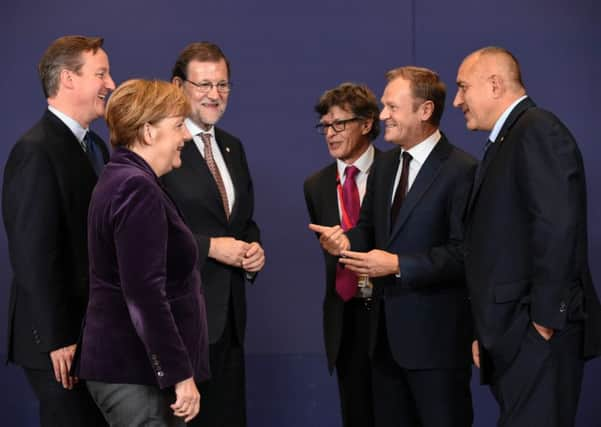Leaders: David Cameron unlikely to impress EU over migrants


As David Cameron arrived in Brussels ahead of a working dinner on EU reform at a summit of European leaders, he promised he would be “battling hard for Britain, right through the night”.
While we should remember these are just negotiations, it could be seen that the Prime Minister is close on three out of four of his key objectives – protecting Britain’s sovereignty by exempting the UK from ever closer political integration, protecting the single market for Britain and setting a target for getting rid of red tape.
Advertisement
Hide AdAdvertisement
Hide AdHowever, the major sticking point Mr Cameron is encountering is his aim to deny the right of in-work benefits to migrants for four years. The issue could be seen as one of the most important and challenging negotiations of his prime ministership.
Last month Mr Cameron claimed that recent migrants from the European Economic area received around £6,000 on average annually of in-work benefits, which include boosting incomes by tax credits.
He is also looking at stopping out-of-work migrants getting state help to reduce the “pull factor” to the UK. But civil servants have reportedly warned him and his ministers that such actions could be deemed discriminatory and regarded as flouting EU law.
The Prime Minister is well aware that he not going to get anywhere over trying to restrict migrants’ freedom of movement. So instead he wants to make it more difficult for migrants arriving in Britain who may be expecting financial help in the hope that fewer migrants will be attracted and therefore it is a way of achieving his aim of reducing the muber of migrants coming in to the country which the Tories see as an issue within the elecorate.
So these are negotiations and there will have to be compromise. One of the compromises that could be on offer here is that other member states will pay back the British government for benefits their citizens receive in the “ban” period. This is not a compromise Mr Cameron is going to like because it will mean no disincentive to migrants coming here.
So there will be much discussion and Mr Cameron is likely to emerge from the summit with some concessions. He has after all, said he wants Britain to remain in the EU once he has fought this battle and taken back some powers.
But it is important not to get too distracted by Mr Cameron’s demands which he would like to see delivered before a referendum on whether the UK stays in or comes out of the EU, a vote to be held by the end of 2017.
We should bear in mind that for much of the British public whatever reforms Mr Cameron might achieve and however he might seek to portray them are not at the heart of the Eueopean question. Many people are happy with the benefits of being in the EU under the current set-up. Furthermore many hold the view that leaving the EU would seriously damage the UK. Let’s not make the EU decision rest on Cameron’s reforms.
Car smoking ban a worrying step
Advertisement
Hide AdAdvertisement
Hide AdEveryone agrees that second-hand smoke damages children’s health. And everyone agrees that we should all do everything in our power to prevent anything harming youngsters.
But the difficulty with the ban on smoking in cars when children are passengers, which will become law in Scotland next year, is that the car is private space.
The next logical place for anti-smoking enforcers to go would be right into the home where someone is having a cigarette or puffing on a pipe, or even into a room to check if there is smoke or the smell of nicotine lingering in the air from a past indiscretion.
That must surely be an intrusion too far.
The new legislation, to be enforced by Police Scotland, has been criticised by Simon Clark, director of Forest, a campaign group for promoting smokers’ rights who fears that smoking in cars may be banned wether or not there are children present.
Mr Clark also points out that resources are scarce and disregard the practical realities of how such measures are to be carried out and financed.
There is no doubt the smoking ban in pubs and public places has been a good thing. We can now enjoy a smoke-free night without increasing our chances of getting lung cancer or going home smelling like an ash-try.
But as the move to ban smoking in various locations gathers pace, it would appear to take precedence over the very basic concept of our right to private space.
It is important not just to focus on the details of the latest “no-smoke zone” but to look at the bigger picture of protecting our basic rights to have places which are our havens, none more so than our home.